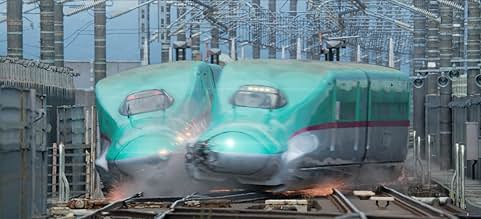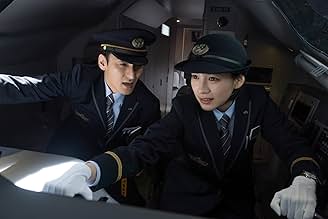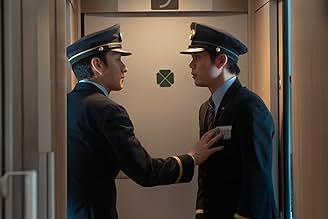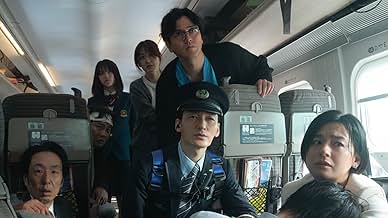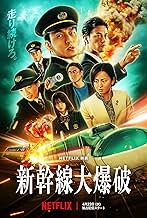Un grupo que ata bombas a un tren bala japonés en un intento de extorsionar al gobierno con dinero.Un grupo que ata bombas a un tren bala japonés en un intento de extorsionar al gobierno con dinero.Un grupo que ata bombas a un tren bala japonés en un intento de extorsionar al gobierno con dinero.
- Dirección
- Guión
- Reparto principal
Reseñas destacadas
An affectionate and well-realised update of Junya Sato's The Bullet Train, Bullet Train Explosion's devotion to delivering relentless edge-of-your-seat thrills ensures it's a blast from the moment it leaves the station. After his masterful reworking of Ultraman 3 years ago, I've been patiently waiting for Shinji Higuchi's next film. While the visual effects, direction, cinematography and camerawork are all top-notch, the carnage feels relatively restrained compared to Higuchi's prior work. However, even then, the film's greatest strength lies in its construction of tension and its commitment to showing how people respond to chaos. Some rise while others fall. Even with Higuchi as the film's conductor, this is still very much a one-track film, where Sato's original cross-cuts the action on board its Shinkansen with Ken Takakura's criminal antics, and here we are solely dedicated to the action on board. Despite its familiarity, there's also a fair dose of originality, although the late-game villain reveal had me howling with unintentional laughter. It's a long journey, full of near misses and assorted beats of suspense; although it abandons the complicating human factors that gave the original its soul, the film works very effectively as both a remake and a legacy sequel alike, even if the first half is far stronger than its latter half. Backed by strong performances and a rousing score by Taisei Iwasaki, Bullet Train Explosion is an effectively solid action disaster throwback, full of collectivism and collaboration.
Bullet Train Explosion (2025) is an interesting ride that tries to bring back the disaster-thriller vibe but falls a little short on the human side of things. The directing by Shinji Higuchi feels like it cares more about showing the technical process of running a train than about telling a story through its characters. You can tell a lot of work went into the production itself, especially with the practical effects, model sets, and tight editing that really keep the tension high. The problem is, while everything looks good and feels intense, the characters end up feeling like background noise rather than the heart of the movie. It feels more like you are watching a really well-made simulation than being pulled into a story.
The acting is decent, especially from Tsuyoshi Kusanagi, who manages to bring some presence even without a lot of material to work with. The script, though, feels a bit thin, like it was written just enough to move from one tense scene to another without really digging into who these people are. The cinematography is clean and sharp, with some really impressive shots during the action sequences, and the sound design does a solid job of keeping you in that high-stakes atmosphere. The score is there but not very memorable, mostly serving the moment without standing out. Overall, it is a movie you can enjoy for the tension and visuals, but if you are hoping to get attached to the characters or dive deep into the story, it might leave you wanting more.
The acting is decent, especially from Tsuyoshi Kusanagi, who manages to bring some presence even without a lot of material to work with. The script, though, feels a bit thin, like it was written just enough to move from one tense scene to another without really digging into who these people are. The cinematography is clean and sharp, with some really impressive shots during the action sequences, and the sound design does a solid job of keeping you in that high-stakes atmosphere. The score is there but not very memorable, mostly serving the moment without standing out. Overall, it is a movie you can enjoy for the tension and visuals, but if you are hoping to get attached to the characters or dive deep into the story, it might leave you wanting more.
Not only was the story intense, but I really loved how they showcased the technical operations of the Tohoku Shinkansen - from the control room decisions to the real-time communication between the operator, conductor, and driver. It all felt incredibly authentic, like watching real professionals in action. Their calmness, precision, and teamwork during high-stress moments really stood out and added so much depth. As a Shinkansen otaku, seeing those accurate procedures and behind-the-scenes details was an absolute thrill and made the experience even more enjoyable. The attention to detail was remarkable.
I just finished watching Netflix's new "Bullet Train Explosion" (2025) and couldn't help but notice all the comments claiming it's "just a Speed ripoff." Oh, sweet summer children of cinema...
For those whose film history knowledge apparently begins with Keanu Reeves, allow me to enlighten you: "Shinkansen Daibakuha" isn't copying Speed (1994). It's a REBOOT of the ORIGINAL "Shinkansen Daibakuha" from 1975 - a Japanese disaster thriller released NINETEEN YEARS BEFORE "Speed" even existed.
That's right. The "can't slow down or it explodes" concept that everyone associates with "Speed" was actually pioneered by this Japanese film starring Ken Takakura, Sonny Chiba, and other legendary Japanese actors nearly two decades earlier. The original featured Japan's bullet train that would explode if it dropped below 80km/h, with criminals demanding ransom money.
So who copied whom? If anything, "Speed" borrowed from Japan, not the other way around. Shinji Higuchi's new Netflix adaptation is simply bringing a Japanese classic back to life for a new generation.
The irony of Western viewers accusing a Japanese reboot of copying an American film that may have been "inspired" by the original Japanese concept is absolutely delicious. It's the perfect embodiment of that meme where someone makes a joke, someone else says it louder, and gets all the credit.
For those whose film history knowledge apparently begins with Keanu Reeves, allow me to enlighten you: "Shinkansen Daibakuha" isn't copying Speed (1994). It's a REBOOT of the ORIGINAL "Shinkansen Daibakuha" from 1975 - a Japanese disaster thriller released NINETEEN YEARS BEFORE "Speed" even existed.
That's right. The "can't slow down or it explodes" concept that everyone associates with "Speed" was actually pioneered by this Japanese film starring Ken Takakura, Sonny Chiba, and other legendary Japanese actors nearly two decades earlier. The original featured Japan's bullet train that would explode if it dropped below 80km/h, with criminals demanding ransom money.
So who copied whom? If anything, "Speed" borrowed from Japan, not the other way around. Shinji Higuchi's new Netflix adaptation is simply bringing a Japanese classic back to life for a new generation.
The irony of Western viewers accusing a Japanese reboot of copying an American film that may have been "inspired" by the original Japanese concept is absolutely delicious. It's the perfect embodiment of that meme where someone makes a joke, someone else says it louder, and gets all the credit.
But this is really good! I like the 3D-effects regarding to the bullet train and I green screen effects where they made it exceptionally clear. In perspective this not really realistic as it is in Japan, 'cause it's too much of actions. But in general I liked the actor's character more their personalities that fits into the movie. I was surprised about the character's performance regarding to bomber that planted the bomb on the train. That felt so good with the twist in the good way. However that is, I'm not gonna spoil it. So watch the movie and enjoy actions felt with sweat and tears. You'll not regret it!
¿Sabías que...?
- CuriosidadesThe 109 terror case that the TMPD boss and JR officials constantly references is named after the HIkari 109 bullet train that was threatened with a bomb in the original 1975 Bullet Train movie. The Hikari train is one of the original 1964 Shinkansen trains still in service on the Tokaido to San'yo lines. Before it was part of the Shinkansen service, the Hikari was an express train until 1958. It was considered the fastest train in Shinkansen line until Nozomi trains in 1992.
- ConexionesRemake of Pánico en el Tokio Express (1975)
Selecciones populares
Inicia sesión para calificar y añadir a tu lista para recibir recomendaciones personalizadas
Detalles
- Duración
- 2h 14min(134 min)
- Color
- Mezcla de sonido
- Relación de aspecto
- 2.35 : 1
Contribuir a esta página
Sugerir un cambio o añadir el contenido que falta



